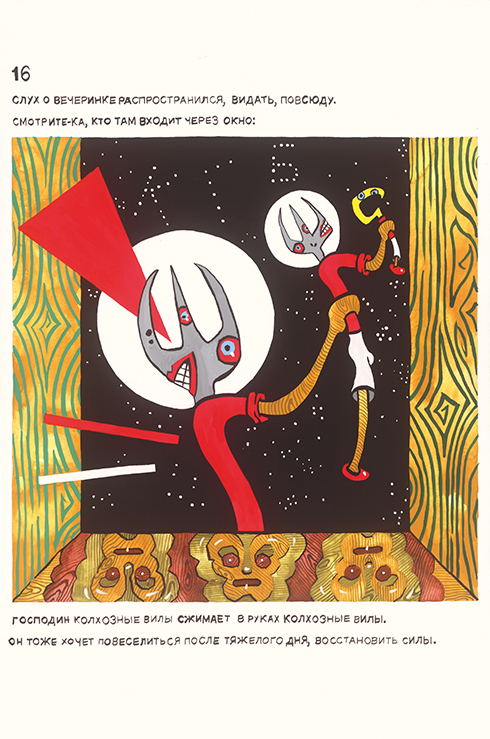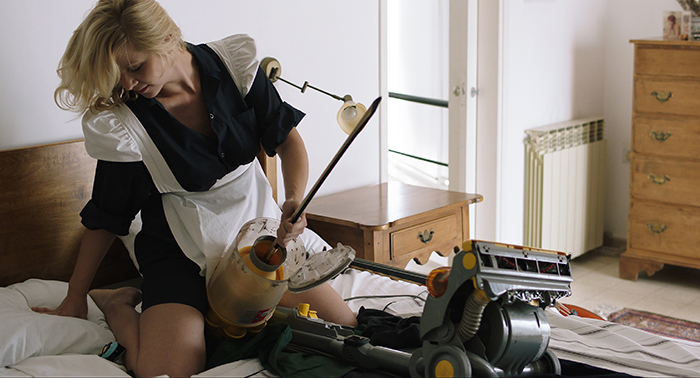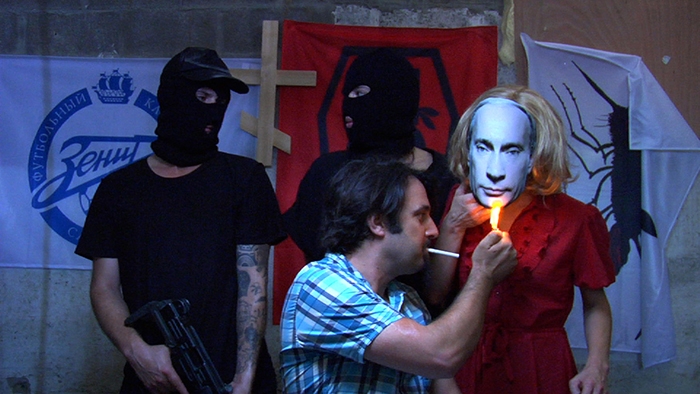‘Whatever you think of the Israeli occupation’ the stand-up announces, ‘it is much better than the Nazis.’ She is Jewish; her audience is Austrian. Having been announced onto the stage as Rosie Rosen, she introduces another Rosen – a ‘kike’ gynaecologist – as the protagonist of one of her jokes. Trapped in the collapsing Twin Towers with a whimpering WASP millionaire and a pregnant Swedish goddess, this Rosen decides to order a plate of his mother’s Ostjuden cuisine from a magical, wish-granting goldfish that appears amidst the fire and smoke. Watching from the wings, as this bewilderingly offensive (and very funny) live performance on the opening night of the 2018 edition of Austrian arts festival Steirischer Herbst breaks down, is its writer: a neatly dressed, fiftysomething, male, Israeli artist named Roee Rosen.
The joke nods to the Russian folk-tale, collected by the Brothers Grimm and later adapted for verse by Alexander Pushkin, in which a poor woman abuses the wish-granting powers of a golden fish to demand ever-increasing elevations of her status in the world. When she demands powers equal to God, the fish resolves the situation by returning everything to how it was before. In the artist’s world, there is no such prospect. Which is to say – borrowing the punchline to Rosie’s goldfish joke – that we’re all going to die.
In protest at the limits of human consciousness, the artist and writer has, over the past three decades, established a variety of avatars through which to disperse his experience of the world. They include a neglected European Jewish painter, a paranoid Russian poet who founds a collective devoted to resuscitating the Soviet avant-garde and a slippery character named ‘Roee Rosen’ who is played by, among others, unreliable academics and undocumented immigrant workers.
His videos, texts and paintings use humour, sex and violence to dismantle Jewish identity and, beyond that, the psychological construct of individual selfhood. Given that his experiments in disorientation include a pornographic novel in which Jewish mysticism is counterpointed with a character’s sodomy by an enchanted broom, an ‘entertainment experience’ inviting the viewer to enter the character of Hitler’s lover during the Führer’s last days in the bunker, and a short video in which a dominatrix casts out the spirit of hardline former Israeli defence minister Avigdor Lieberman from a young woman in the course of a BDSM session, I was intrigued to hear Rosen describe the project-in-progress he debuted at Steirischer Herbst as his greatest sacrilege yet. It’s called Kafka for Kids. And this musical adaptation of The Metamorphosis (1915) – featuring bewitched furniture and nursery rhymes about psychological breakdown scored by an orchestra playing toy instruments – takes the form of a film masquerading as a children’s television show which is interrupted by a lecture on Israeli military law.
If something makes me sweat or giggle then I know it’s worth thinking about
Speaking by phone from his base in Tel Aviv, Rosen describes Franz Kafka as his one remaining “sacred cow” and the project as a conscious “betrayal” of his literary hero. While it might seem profane to recast this giant of Jewish letters as a kids’ writer, it also extends (or rather overextends) a reading proposed by Gilles Deleuze and Félix Guattari in Kafka. Pour une littérature mineure (1975), which reclaims the joyful, subversive and ecstatic qualities of the Czech author’s writing. Kafka’s world of transformation, in which things are always “in-between and becoming”, in Rosen’s description, is also attuned to the artist’s preoccupation with the unsettling of authority and the dissolution of selfhood. ‘There is an end but there is no way,’ as a Kafka aphorism paraphrased in another of Rosen’s works puts it, ‘what we call a way is only wavering.’

This movement is the key formal characteristic of Rosen’s oeuvre, with ideas, images and phrases migrating across works and personae. His recent films have used channel-hopping as a formal device, montaging advertisements for commodities with news reports of atrocities, and revelling in the discomforting slippage of affects from one context into the other. Take the lecture that interrupts the broadcast of his kids’ take on The Metamorphosis, in which a legal expert, played by the Israeli actress Hani Furstenberg (who also performed as the comedian), delivers a detailed account of how a twelve-year-old Palestinian girl caught carrying a knife can be tried and imprisoned as an adult while an Israeli child in the same situation would be protected by her status as a minor.
That the juxtaposition between children’s television programme and the abuse of children’s rights is jarring is integral to its function. The lecture segment was conceived as documentary, and Rosen went so far as to approach a think tank of activists, lawyers and legal experts to host a discussion. Yet he was wary of creating an “emotionally unambiguous experience” in which the presumptively liberal audience would unreflectingly side against discriminatory policies. So he transformed his research on the subject into a monologue for Furstenberg in which she sniffs suspiciously at her armpit (a recurring motif in Rosen’s work), seems to lose control of her bodily functions and veers into erotic reveries around a Ghanaian veterinarian named Kwame set 50 years from now while two bearded men in the audience kiss. Rosen seeks out the discomforts caused by these unconscious physical reactions – “if something makes me sweat or giggle then I know it’s worth thinking about” – and a line in the lecture nods to André Breton’s assertion that beauty must be ‘convulsive’. Such uncontrollable bodily responses to emotional states – convulsion, crying, laughter, sweating – alert us to things that we would rather keep hidden. To exploit those effects in the context of a discourse on suffering and injustice is not only audacious but also, to use a word to which Rosie pointedly returns in her routine, “improper”.
Rosen describes the characters played by Furstenberg as “puppets”, and the phrase brings to mind Vladimir Nabokov’s disdain for the ‘trite little whimsy about characters getting out of hand’ and dictating their fates to the author. Fictional characters are not in charge of their own destiny, Nabokov made clear, they are the author’s ‘galley slaves’. But what if the submissive slave enjoys being dominated? Sweet Sweat (2009), a novel written by Rosen in the guise of Justine Frank, a fictional neglected female Jewish Surrealist and lover of Georges Bataille, is one of several works to explore masochism and sadism as means of upending established systems of power.
Rosen uses humour, sex and violence to dismantle Jewish identity and the psychological construct of individual selfhood
A three-part invention, the book combines Frank’s novel with a biography and academic essay authored by Roee Rosen, nodding to the structure of Bataille’s 1941 story Madame Edwarda (with its preface warning that ‘if you laugh, it’s because you are afraid’). The combination of critical theory, fake histories and transgressive subject-matter is typical of Rosen, as are the links that seem to establish unexpected affinities between works in his oeuvre: the heroine of Bataille’s novel is a prostitute who, like the woman in the folktale, declares herself to be God.
It’s difficult to ignore that Justine shares a surname with the most famous Jewish writer of all, and tempting to link the work to Philip Roth’s equally sacrilegious The Ghost Writer (1979), the narrator of which entertains erotic fantasies about the woman he imagines to be Anne Frank. But Rosen’s preface to Sweet Sweat posits Frank as related to the eighteenth-century Polish-Jewish heretic-mystic Jacob Frank (notorious for his doctrine of ‘purification through transgression’). Her first name, meanwhile, is surely borrowed from the victim-heroine of the Marquis de Sade’s Justine ou Les Malheurs de la Vertu (1791). Rosen delivered his own confessions in 2013 via three undocumented foreign workers speaking halting phonetic Hebrew to camera. ‘I have built my entire career on lies,’ is among the first of The Confessions of Roee Rosen (2008), ‘I have pretended not to be myself.’ The works force the viewer to ask whether the experiences being recounted are those of the named author – Roee Rosen – or the people delivering them to camera who, without the protection of a legal identity, must every day live a lie.
Rather than demolishing the binaries that shape our experience of the world – self and other, truth and fiction, reason and unreason, childlike and adult, good and evil – Rosen plays in the dangerous no-man’s land between them. These states of consciousness can be achieved through humour and sex but also by inhabiting other subjectivities, which is to say by fiction. A phrase in The Confessions plays on Saint Augustine’s description – in his own Confessions (379– 400) – of his soul as being like a house, ‘small for [God] to enter, but I pray you to enlarge it. It is in ruins, but I ask you to remake it.’ The power to remake the world belongs to those who can install themselves in the subjectivities of other people and things.

The author’s responsibility to take the perspective of minorities, animals and objects was promoted by the Russian formalist critics to whom Rosen pays homage in a series attributed to the Tel Aviv-based Buried Alive Group. The group, whose work was exhibited in Rosen’s show at Kunsthal Charlottenborg earlier this year, was founded by Maxim Komar-Myshkin, the pen name of a Russian poet who migrated (in common with several of Rosen’s personae) to Rosen’s hometown of Tel Aviv. Responding to Sergei Tretyakov’s call for ‘biographies of objects’, the collective shot a series of ‘animations for commodities’ such as Little Iron (2013), in which another of Rosen’s regular collaborators, Igor Krutogolov, serenades a midcentury steam iron to the accompaniment of a skittering, Prokofiev-ish piano line.
The Dust Channel (2016), a 23-minute video shown in Kassel as part of Documenta 14, pays homage to the first Dyson-brand vacuum cleaner while also using the bigoted comments of its inventor to consider issues around the free movement of ideas and the restricted movement of people in a globalised society. Like Keston Sutherland’s epic poem The Odes to TL61P (2013), a love song to an obsolete washer-dryer that moves out into discussion of Marxist theory and the author’s sexual history, these mundane objects become the suns around which Rosen can construct a constellation of social and historical references running from the Sex Pistols to the treatment of asylum seekers in Israel. This literal take on commodity fetishism also presents a vision of the world as being, like Rosen’s oeuvre, inextricably entangled: everything relates to everything else.
That might be understood as aspiring to the ‘impossible state of existence: autonomy without territory’ that Justine Frank seeks out. Rosen’s inhabitation of other subject positions – whether female, animal, object – is a risky and revolutionary project in the context of a society in which the deep-seated desire of human beings to transcend their individual selves has been constrained by the triumph of materialism and the entrenchment of identitarian politics. Yet Rosen declares himself “optimistic” that art and literature might continue to offer the opportunity to “become something else, which I experienced very early in my life as imperative: our need as human beings is to be more than one, not to be limited by what we were given.”
Work by Roee Rosen is featured in Laughing / Lachen, a group exhibition at Taxis – Palais Kunsthalle Tirol, Innsbruck, through 15 March
From the March 2020 issue of ArtReview
